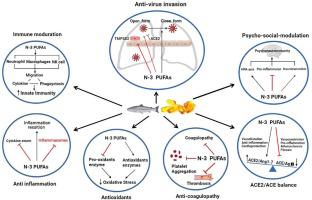Brain, Behavior, and Immunity ( IF 8.8 ) Pub Date : 2022-04-04 , DOI: 10.1016/j.bbi.2022.04.001 Chun-Pai Yang, Ching-Mao Chang, Cheng-Chia Yang, Carmine M. Pariante, Kuan-Pin Su

|
The global spread of severe acute respiratory syndrome coronavirus 2 (SARS-CoV-2) has led to the lasting pandemic of coronavirus disease 2019 (COVID-19) and the post-acute phase sequelae of heterogeneous negative impacts in multiple systems known as the “long COVID.” The mechanisms of neuropsychiatric complications of long COVID are multifactorial, including long-term tissue damages from direct CNS viral involvement, unresolved systemic inflammation and oxidative stress, maladaptation of the renin-angiotensin-aldosterone system and coagulation system, dysregulated immunity, the dysfunction of neurotransmitters and hypothalamus–pituitaryadrenal (HPA) axis, and the psychosocial stress imposed by societal changes in response to this pandemic. The strength of safety, well-acceptance, and accumulating scientific evidence has now afforded nutritional medicine a place in the mainstream of neuropsychiatric intervention and prophylaxis. Long chain omega-3 polyunsaturated fatty acids (omega-3 or n-3 PUFAs) might have favorable effects on immunity, inflammation, oxidative stress and psychoneuroimmunity at different stages of SARS-CoV-2 infection. Omega-3 PUFAs, particularly EPA, have shown effects in treating mood and neurocognitive disorders by reducing pro-inflammatory cytokines, altering the HPA axis, and modulating neurotransmission via lipid rafts. In addition, omega-3 PUFAs and their metabolites, including specialized pro-resolvin mediators, accelerate the process of cleansing chronic inflammation and restoring tissue homeostasis, and therefore offer a promising strategy for Long COVID. In this article, we explore in a systematic review the putative molecular mechanisms by which omega-3 PUFAs and their metabolites counteract the negative effects of long COVID on the brain, behavior, and immunity.
中文翻译:

长 COVID 和长链脂肪酸 (LCFA):omega-3 LCFA 对 COVID-19 延迟后果的心理神经免疫影响
严重急性呼吸系统综合症冠状病毒 2 (SARS-CoV-2) 的全球传播已导致 2019 年冠状病毒病 (COVID-19) 的持续大流行以及多个系统中异质性负面影响的急性期后遗症,称为“长COVID。” 长期 COVID 的神经精神并发症的机制是多因素的,包括直接中枢神经系统病毒参与的长期组织损伤、未解决的全身炎症和氧化应激、肾素-血管紧张素-醛固酮系统和凝血系统的适应不良、免疫失调、神经递质功能障碍和下丘脑-垂体肾上腺 (HPA) 轴,以及为应对这一流行病而发生的社会变化所造成的社会心理压力。安全的实力,良好的接受度,科学证据的积累现已使营养医学在神经精神病学干预和预防的主流中占有一席之地。长链 omega-3 多不饱和脂肪酸(omega-3 或 n-3 多不饱和脂肪酸)可能在 SARS-CoV-2 感染的不同阶段对免疫、炎症、氧化应激和心理神经免疫产生有利影响。Omega-3 多不饱和脂肪酸,尤其是 EPA,已显示出通过减少促炎细胞因子、改变 HPA 轴和通过脂筏调节神经传递来治疗情绪和神经认知障碍的作用。此外,omega-3 PUFA 及其代谢物,包括专门的促分解素介质,可加速清除慢性炎症和恢复组织稳态的过程,因此为 Long COVID 提供了一种有前途的策略。在本文中,











































 京公网安备 11010802027423号
京公网安备 11010802027423号